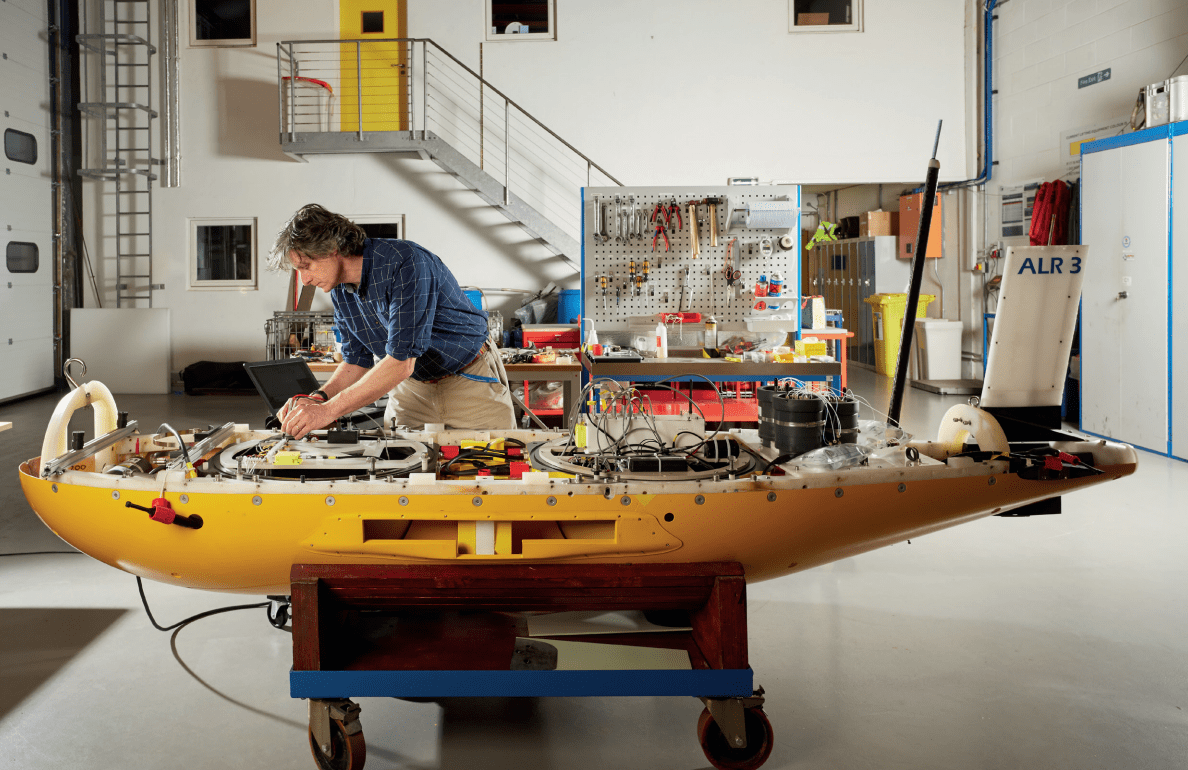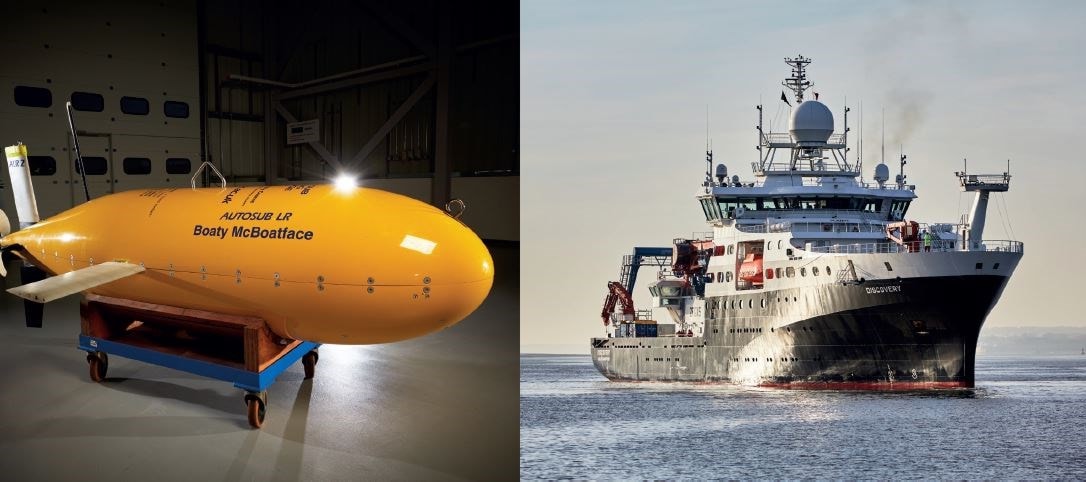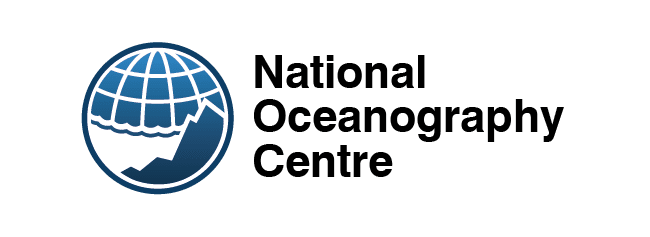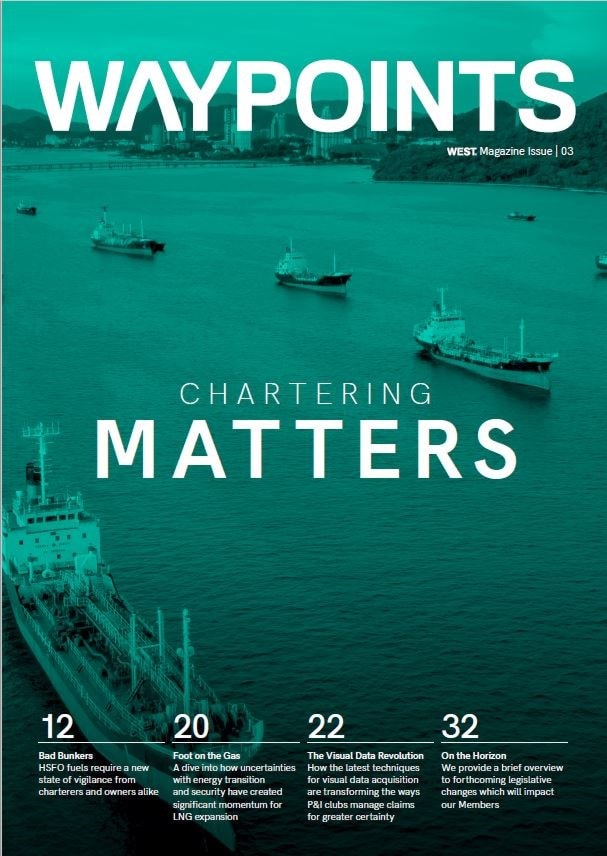National Oceanography Centre - Waypoints Issue 03
The big science taking place every day on the vessels and facilities of the UK’s National Oceanography Centre (NOC) takes many forms, and investing for the future is key, writes Dr Eleanor Darlington.
Eleanor Darlington
(Head of Marine Facilities Programmes, National Oceanography Centre)
One form this investment takes is ensuring the ocean scientific industries will continue to have the correct mix of staff, skills and input from all areas of our planet and this is where a recent connection with West fits in. The West P&I Seagoing Science Bursary, which began last year, provides financial support for students and early career researchers in the field of marine science or oceanography. It also provides opportunities for those from developing countries who are keen to become involved in the field of marine science or oceanography, to gain practical experience of ship-borne science. It is administered and awarded by NOC and will run for 10 years.
Our research is organised into four main areas: Ocean BioGeosciences, Marine Systems Modelling, Marine Physics and Ocean Climate, and Ocean Technology and Engineering. Scientists at the NOC generally focus on one of these key areas of marine science and are responsible for obtaining in-depth knowledge and research. Many projects also involve interdisciplinary research, which involves the collaboration of scientists across a range of research areas, and all of our activities hinge upon our pioneering engineers and technicians who work collaboratively with the scientists to make their research dreams come true.
Managed out of two UK sites in Southampton and Liverpool, and operating two research ships; RRS James Cook and RRS Discovery, we provide research facilities and access to data and samples for the benefit of both UK and world science.

Robotics
The ability to explore the oceans and collect data via uncrewed untethered robotic vehicles has greatly increased our understanding of the oceans. New and innovative autonomous vehicles being developed at the NOC are pushing the limits on how we can explore our oceans, allowing us to reach new depths, travel under ice, take readings in remote areas and robots can continue to collect data during high sea states when crewed surface vessels would be unable to.
Autonomous vehicles can be deployed and remain at sea for several months, recording and storing data and then transmitting the data back to shore when they surface. There are so many questions about the physical, chemical and biological processes in our oceans, and autonomous vehicles could provide many of the answers we are looking for.
There is a growing trend where multiple platforms are working together as a ‘system of systems’ to enable more complex data gathering. These ‘swarms’ can be a homogeneous set of vehicles all acting together to form a measurement network, an example being autonomous ocean bottom seismometers.
The ability to explore the oceans and collect data via unmanned, untethered robotic vehicles has greatly increased our understanding of the oceans
While NOC does own some off-the-shelf vehicles, we also work closely with a range of public and private partners to drive the development of the new vehicles we will need in the future. For instance, we are currently developing the Autosub Long Range (ALR-1500) which will be our longest range AUV (Autonomous Underwater Vehicle) to date. With increased endurance and payload capacity over previous versions, ALR1500 will be optimised for surveying the continental shelf and upper slope, with the potential to complete a full trans-Arctic mission, under ice.
Diversifying our operations has been part of the job for some years, so chartering our vessels and equipment has been playing an increasing role. For example, last year NASA chartered both our research ships for a major deep ocean project.
A large slice of our funding comes under NERC (Natural Environmental Research Council) and they have set a target of being carbon net-zero for 2040. Almost all of the research we facilitate with our vessels, leads ultimately to increasing our understanding of the oceans and hence climate change and sea level rise, so there’s a constant trade-off when it comes to the value of the data we can collect versus the fossil fuels we have to burn to collect the data.
2040 is a challenging deadline when so much of our research must be conducted in remote areas such the polar regions, where infrastructure is almost non-existent, and fossil fuels still rule supreme. It’s unfortunate that the polar regions are the most sensitive and critical when it comes to climate change, yet we have to burn tons of fossil fuels to get there to conduct our important research.

These include very innovative measures such as route optimisation, hull form optimisation, wind assistance technologies, advanced hull coatings, speed reduction, main engine improvements, auxiliary systems improvements as well as modification to allow ships to ‘plug in’ to green shore electrical supplies and even sustainable food policies.
It’s fabulous to work for an organisation that’s leaving no marine decarbonisation stone unturned.
Eleanor Darlington
(Head of Marine Facilities Programmes, National Oceanography Centre)

Eleanor has worked as Head of Marine Facilities Programmes at the National Oceanography Centre in Southampton UK since 2020. Responsible for a diverse range of the national ocean research facilitator’s activities from developing the ships’ schedules, budgetary oversight of the UK marine facilities, to liaising with international partners to optimise global research vessel usage, or sailing as a sea going technician in direct support of marine science, Eleanor has a PhD in Polar physical oceanography and glaciology from Loughborough University.
Find out more about the National Oceanography Centre here
